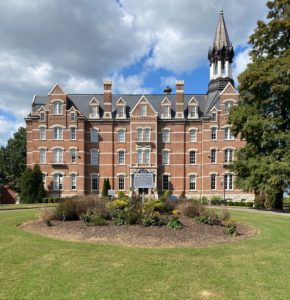
Historically Black colleges haven’t been the most popular higher education option over the past decade: Since 2010, HBCUs have seen an 11% decrease in students nationwide. But this year, some say they’re seeing a boost in interest.
That’s because of students like RePublic High School senior Michael Overton, who says that for college, he wants to be in an environment that caters to Black men and women.
“It just seems like a very welcoming environment for all Black people,” says Overton, who’s applying to HBCUs including Morehouse College and Howard University. “It’s not like you have to be this high ranking to be here.”
In some spaces that are predominantly white, he says, the respect you get as a Black person depends on where you lie in the social hierarchy. That’s even something he’s experienced at his own school.
“I take a lot of AP [and] dual enrollment classes,” says Overton. “I’ll get a different type of respect from teachers, like white teachers, than kids who may just take the regular courses.”
Overton says he’s noticed that some of his friends who are viewed as less smart, or have a look that isn’t seen as acceptable, have often had to deal with racist microaggressions from teachers.
Creating empowering learning environments

Fisk University’s Jubilee Hall
During the past year, RePublic says they’ve been working to address some of the issues that make students like Overton feel uncomfortable. Last month, they invited more than a dozen HBCUs to a virtual college fair as a way to respond to the country’s “moment of reckoning on systemic racism.”
Cassie Lemon, RePublic’s director of college access and persistence, says they’re also in the process of conducting a diversity, equity and inclusion audit that will help them better serve students.
“I think the first and foremost thing is creating a formalized system that students feel is in favor of them,” says Lemon.
The goal, she says, is to build a more empowering environment for students.
That’s something that RePublic senior Kameron Porter is looking for in a college: He sees HBCUs as a place where Black students can embrace their identities without having to appear acceptable to others.
“It’s nothing wrong with having curly hair and your own hairdo,” says Porter. “You can still be a smart, educated woman if you have box braids that are colored. That doesn’t really change anything. It’s about what’s in your head.”
He isn’t against attending a majority white college, he says, but he’d rather pave his own way as a young Black male instead of seeking someone else’s approval.
“We have a culture that a lot of people don’t understand,” says Porter. “Sometimes we try to subdue it during interviews and at jobs because we want to mimic white people’s standard of ‘proper.’ ”
‘We’re Incredibly Encouraged’
Historically Black college enrollment had declined over the past decade, in part because more students were choosing to attend predominately white colleges that were seen as more prestigious. Another issue is that HBCUs have less funding and resources to recruit and attract students.
But that’s changing. Some HBCUs enrolled their largest number of students in decades, according to the Thurgood Marshall College Fund, including Fisk University in Nashville, which enrolled just over 900 students in the fall.
“I think that there is something that happens on campuses like Fisk, where the reinforcement of identify and confidence is something that students are longing for,” says executive vice president Jens Frederiksen.
This empowerment has academic outcomes, too: As of 2015, HBCUs represented 9% of black college students in the country – but graduated 15% of Black students earning bachelor’s degrees.
Frederiksen says he believes that these successes are becoming more apparent to prospective students.
“We view Fisk as a school that should have roughly 2,000 students. The campus is set up for that,” says Frederiksen. “We’re certainly incredibly encouraged by this phenomenon.”

